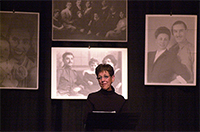A Struggling Performance
Alumna fights back tears reading her mother-in-law's horrific experience
during the Holocaust
By NYRIE KARKAZIAN
She wiped the tears away from her eyes as she read the words Janka Festinger
had written in a letter describing the pain, loss and suffering she went
through during one of the most gruesome and horrible massacres in history.

Janice Noga performed “Janka: One Minute of Perfect Happiness,”
a one woman-play written by her husband about his mother’s
Holocaust experience. Photo by Joseph Hollak |
Janice Noga performed “Janka: One Minute of Perfect Happiness,”
a one-woman play written by her husband Oscar Speace, who based it on
a letter written by his mother about her experience and survival during
the Holocaust.
“Can you imagine this,” Noga said.
She stood behind a lectern at the Satellite Student Union, dressed in
black, as she took on the role of Janka (pronounced YAN-ka) speaking her
words through a thick accent.
“Being Jewish is a curse. We don't even question it,” Noga
said in the drama.
She welcomed the audience to her home and into her tragic survival during
the Holocaust.
Janka said that for her family, the Jewish extermination began in 1944
when the streets were closed off, their belongings taken away and the
hair and beards of every man were shaved off. The Gestapo then came and
took them out of their homes and crammed them into cattle wagons, 95 people
to a wagon. She said that on the eight-day trip her papa aged 20 years
right in front of her eyes.
On the eighth day, they were released from the confined space and stepped
out into the darkness of their new home — Auschwitz. They were lined
up and stripped. The Germans shaved all the women’s heads and shot
whomever tried to resist. As for the pregnant women, they were led straight
into the crematorium. This was the last time Janka would see her brother
and father.
"Can I say that this was the worst day of my life," she said.
For lunch, they ate grass soup and for dinner, a slice of bread. They
could only sleep sitting because of how crowded it was but she said it
didn’t matter, because they couldn’t sleep because of all
the screams.
“What did I do to deserve this,” Janka asked in her letter.
“How could I ever look another person in the eye?”
She said the worst thing of all was that there was no water. Besides all
of this suffering, the women endured the agony of being raped and tortured
by the German soldiers.
“Do you think they raped me,” Noga said. “What would
you do for a drink of water?”
The Americans brought liberation to Auschwitz in 1945, and the Germans
surrendered without a gunshot.
“We were in the midst of hell ... the Americans brought with them
freedom and warmth,” Noga said.
Noga jumped back and forth into Janka's life before and after the Holocaust
as she told of the horror and atrocity of life in the camp. She would
speak of a happier time and place when she moved to America with her husband
Bob Speace, an army solider.
Noga read of Janka’s two sons who brought love and joy to her life.
She told stories of how they were great scientists at a young age and
of their wonderful life away from her past.
Unfortunately, Janka never shared her tragic story with her children,
and the letter which inspired Speace to write the play was found two years
after her death.
“You have captured your mother,” Noga said to her husband.
Speace and Noga both graduated from Fresno State in the 1970s and still
live in Fresno. Noga said she hopes to take the performance to Broadway,
or at least off Broadway.
“It was very powerful and a captivating performance,” said
Damien Terronez, special events coordinator of the USU, which sponsored
the event.
Terronez also said he feels one-person plays are innovative one person
can be just as powerful as many.
Noga ended her performance by speaking of Janka's husband and children
and singing a song that Janka sung to them. As the lights dimmed on the
stage, Janka’s story ended with the repetition of two words “I'm
praying.”
“It's an incredible opportunity to tell a vibrant woman's story
as an actress; it’s different every night,” Noga said.
|
